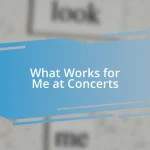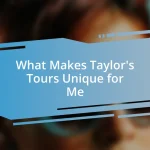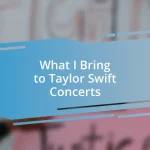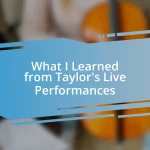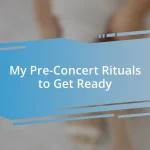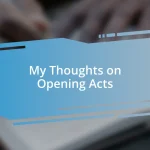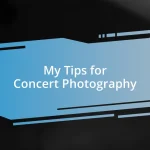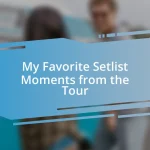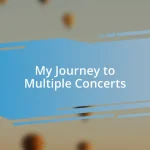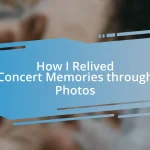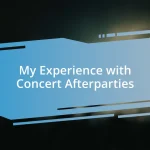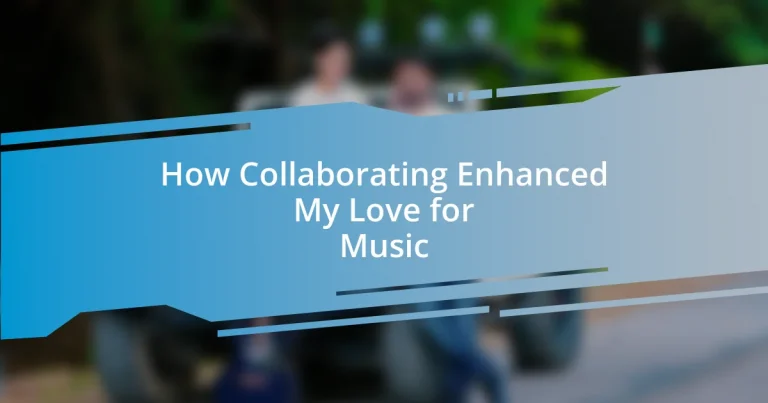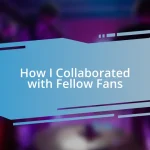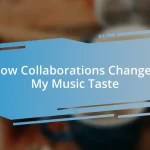Key takeaways:
- Collaboration enhances musical passion by introducing diverse influences and encouraging exploration of new genres, fostering creativity and connection.
- Forming musical partnerships builds trust, communication, and friendship, leading to shared experiences that deepen appreciation for music.
- Exchanging knowledge and celebrating collective achievements promote personal growth, camaraderie, and a sense of community in the music-making process.
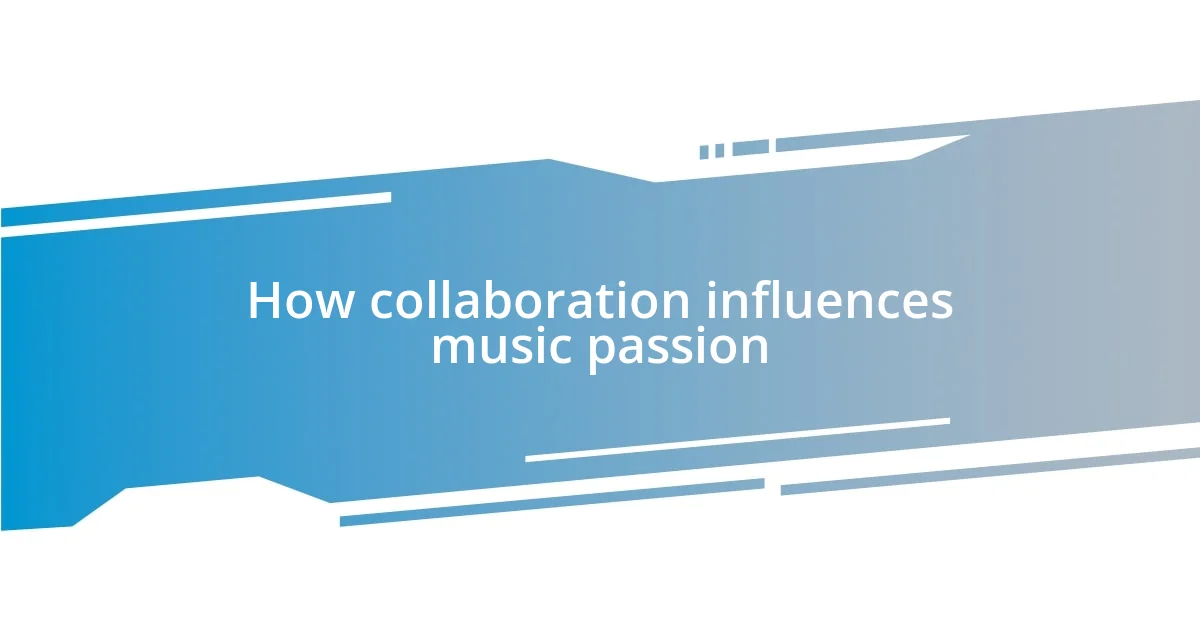
How collaboration influences music passion
Collaboration has a magical way of igniting my passion for music, as it opens doors to diverse influences and creative expressions. I remember my first jam session with a group of friends; each note we played felt like a conversation. Isn’t it incredible how sharing ideas can create something neither of us could have imagined alone?
When I worked with a talented vocalist on a track, the energy transformed my enthusiasm for composition. I found myself re-arranging melodies and experimenting with harmonies just to match her voice’s unique flair. Have you ever felt inspired by someone else’s talent? That connection through collaboration makes music feel more like a shared journey rather than a solitary task.
Moreover, collaborating often pushes me out of my comfort zone. There was a time I hesitated to try a genre I wasn’t familiar with. But my partner’s encouragement led me to explore new sounds, and I ended up discovering a deep love for that style. It’s fascinating how stepping into someone else’s musical world can elevate our own passion, wouldn’t you agree?
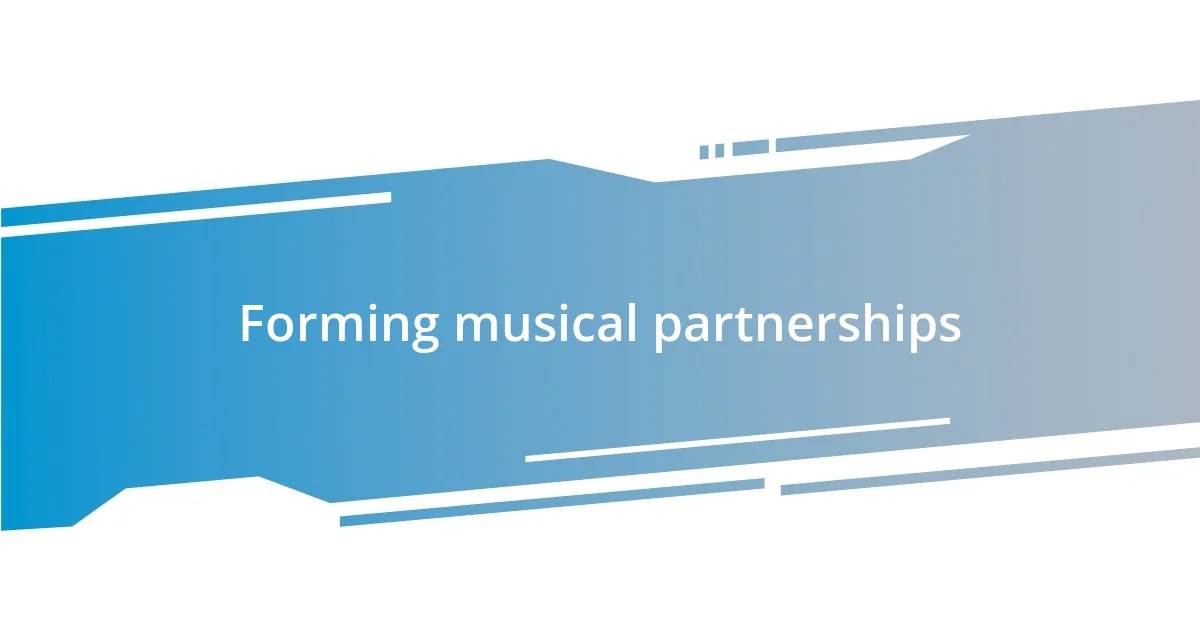
Forming musical partnerships
When I think about forming musical partnerships, I can’t help but recall the days spent in a modest garage, surrounded by friends who shared a love for jamming. Those sessions weren’t just about playing instruments; they became a safe space for vulnerability and self-expression. The thrill of finding common ground while experimenting with lyrics and rhythms truly deepened my appreciation for music.
- In those moments, I learned the importance of trust and open communication.
- We encouraged each other’s ideas, no matter how wild they seemed.
- Each shared experience built lasting friendships and a deeper connection to the music itself.
Another memorable partnership came when I teamed up with a brilliant guitarist. Initially, I was nervous, feeling like I was stepping into a league I wasn’t quite ready for. But as we shared sessions, I recognized the power of our contrasting styles—his intricate solos blending seamlessly with my simple chord progressions. The thrill of seeing our ideas intertwine made me realize how partnerships unlock creativity and can reveal possibilities beyond our imagination.
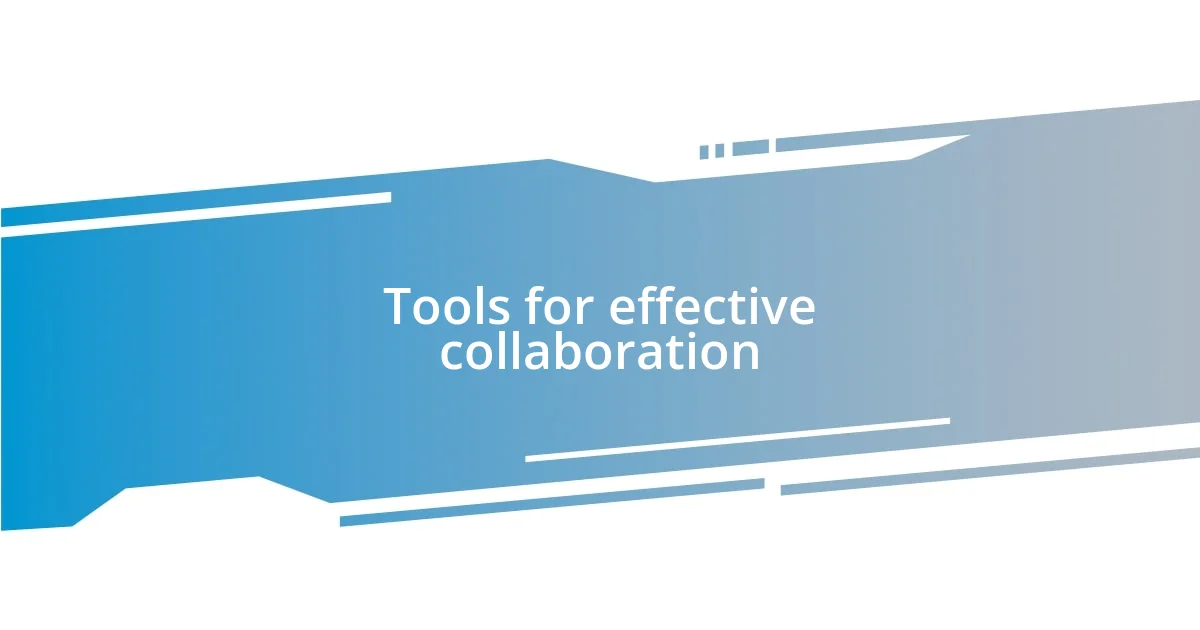
Tools for effective collaboration
Tools for collaboration play a vital role in enhancing musical creativity. I’ve found that using cloud-based platforms like Google Drive for sharing files makes communication smoother. Once, while working on a song, we could instantly upload and comment on each other’s ideas, which helped refine the track in real-time. This type of technology not only streamlines our process but creates an environment where feedback flows freely.
From online meeting tools to collaborative apps, the choices can be overwhelming. I’ve personally enjoyed using platforms like Zoom for virtual jam sessions. It’s fascinating how even across distances, we can connect as if we’re in the same room. The emotional charge of playing together, despite physical barriers, made me appreciate the power of technology in bringing creators together.
Ultimately, an essential aspect of effective collaboration is the software enabling it. I remember feeling such a rush when using DAWs, or Digital Audio Workstations, like Ableton Live. The features allow for smooth mixing and layering, and the outcome can lead to unexpected musical discoveries. It’s amazing how these tools can transform raw ideas into polished compositions, often enhancing my love for music even further.
| Collaboration Tool | Benefits |
|---|---|
| Google Drive | Easy file sharing and real-time feedback |
| Zoom | Facilitates virtual connections despite distance |
| Ableton Live | Offers advanced mixing features for creativity |
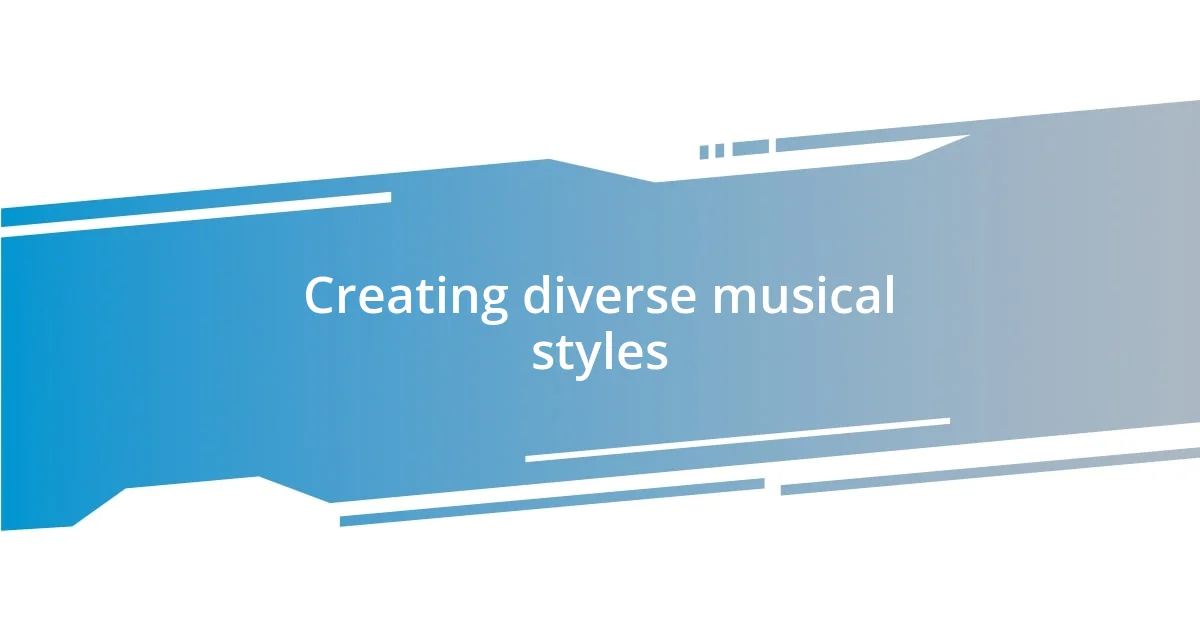
Creating diverse musical styles
Creating diverse musical styles is something I’ve genuinely come to cherish. One experience that stands out happened during a collaboration with a friend who was into reggae. I had never really explored that genre before, but as we played together, I was amazed by how my folk-inspired melodies adapted to the lively rhythms of reggae. Have you ever noticed how different genres can breathe new life into your own style? It’s almost as if the music takes on a personality of its own when you infuse it with various influences.
I still remember the first time we combined elements of jazz, rock, and hip-hop. It felt like throwing paint on a canvas and just watching the magic happen. With every chord change, I could feel the energy shift, and our jam sessions became a playground for experimentation. I think this is where I truly understood the power of blending styles—it’s like uncovering hidden treasures within music that you didn’t even know existed. For me, those moments shaped my sonic palette and enriched my musical identity.
There’s a special thrill in the unexpected. I once partnered with a music producer who had a knack for electronic sounds, and together we aimed to create something entirely unique. Initially, I was hesitant, worried that my acoustic background might clash with his electronic vibes. But as we dove into the creative process, I realized how our profoundly different approaches could harmonize. The fusion of organic and synthetic elements opened up avenues I hadn’t even considered. Isn’t it incredible how collaboration not only broadens our musical horizons but also transforms our understanding of artistry?
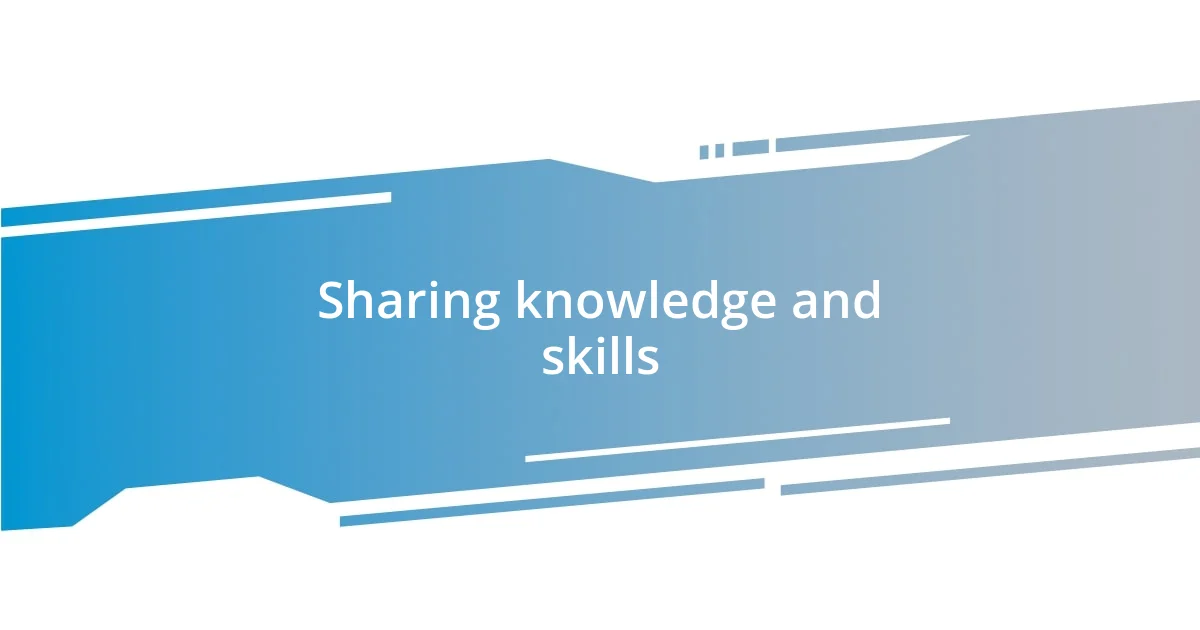
Sharing knowledge and skills
One of the most rewarding aspects of collaborating is the exchange of knowledge and skills. I remember a time when I teamed up with a pianist who had a classical background. Initially, I felt intimidated by his technical prowess, but as he shared techniques on chord progressions and dynamics, I found a new depth in my own songwriting. Isn’t it fascinating how learning something new can reignite your passion? I think that sharing expertise can transform our approach to music in ways we often don’t expect.
When I collaborate, I eagerly embrace the opportunity to teach what I know as well. During a session with a novice guitarist, I demonstrated fingerpicking techniques that I had honed over the years. Seeing the excitement in their eyes as they slowly grasped the skill was incredibly fulfilling. To me, it’s like lighting a spark. Whenever I share a bit of my journey, it creates a genuine connection, making the creative process even more enriching. Have you experienced that shared enthusiasm when teaching someone else?
In my experience, the back-and-forth nature of knowledge exchange fosters a sense of camaraderie. I distinctly recall a songwriting retreat where we all took turns presenting our unique styles. Each individual contributed insights that had never crossed my mind. I discovered that while one person excelled at lyrical writing, another had a gift for melody. Participating in these collaborations not only deepened my appreciation for others’ skills but also shed light on my own. It’s a beautiful reminder that we grow stronger together in our shared love for music.
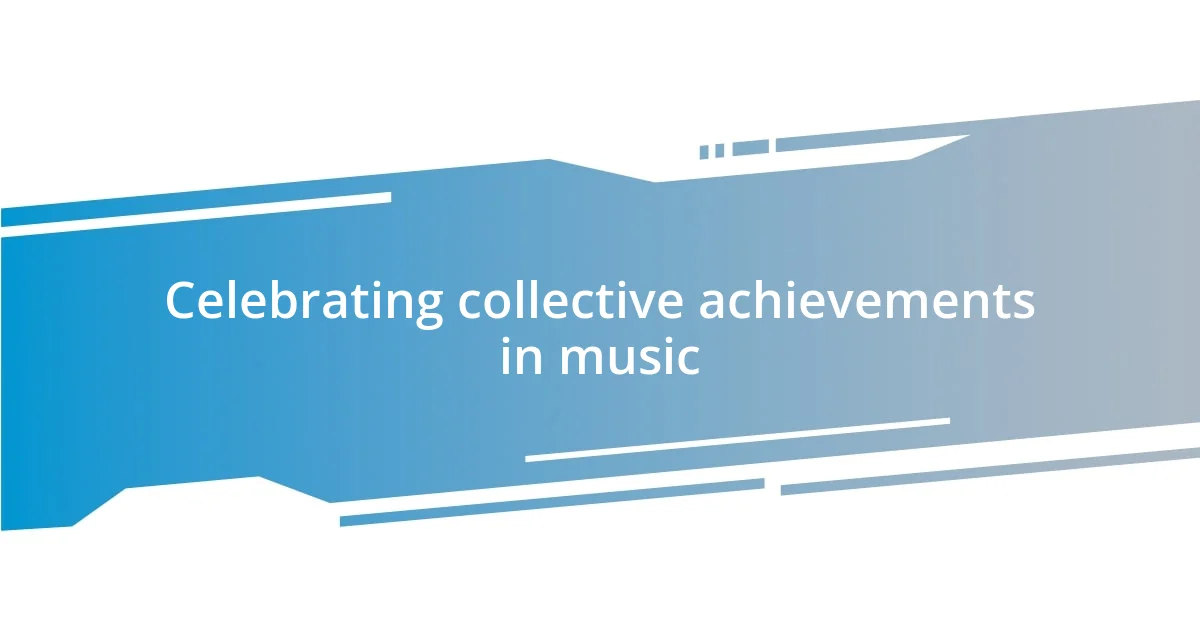
Celebrating collective achievements in music
Collective achievements in music often bring a sense of fulfillment that is hard to describe. I vividly recall the moment our local band finished recording our first EP together. The energy in the room was electric, and as we listened to the final mix, I felt an overwhelming sense of pride. It wasn’t just my work; it was the culmination of each member’s unique contribution. Have you ever felt that wave of joy when a team effort finally pays off? It’s truly exhilarating.
Another memorable experience came when we gathered our community for a charity concert. Each artist contributed their unique style, and the performance became a beautiful tapestry of sound. I remember standing backstage, feeling a surge of gratitude as I watched friends and fellow musicians translate their individual talents into something much larger. It struck me then how music has this unparalleled ability to unite people. What greater achievement is there than using our collective voices to create a positive impact?
Looking back, I understand that these shared accomplishments transcend personal recognition. They evoke feelings of camaraderie and belonging that resonate deeply. For instance, after our successful concert, we celebrated with a simple pizza party, laughing and recounting the highs and lows of our journey. That’s when I realized that the true reward doesn’t lie solely in the accolades but in the relationships and experiences we build through our musical collaborations. How can any of us forget the beauty of celebrating milestones that are enriched by the contributions of others?
